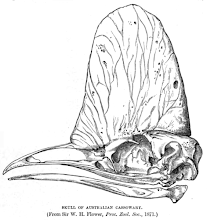i went to the garden/pet store today with my sister to get a tank for her new fish, Dog. i let her get the fish stuff while i looked at the birds. there was a cockateil, two lovebirds, about seven parakeets, and some finches.

the finches at the store were called society finches [see above]. aptly named, as they were white, black, and beige. very sophis.
finches are songbirds in the order passeriformes that typically eat seeds, nuts, and insects. daily activities include foraging and flitting around looking cute. they can be found pretty much all over the world, and i would guess this is because seeds can be found pretty much all over the world. a common finch you have probably seen is the house finch:

careful, don't confuse it with the purple finch! i did that once, how embarrassing for me. ornithologists can be so stuck up sometimes.

that's a map showing house finch radiation throughout the years in the US. i wonder if there is a west-coast subspecies and an east-coast subspecies?
though finches can be found all over the globe, the most famous ones are those of the galapagos.

the galapagos finches are really famous because of ole chuck darwin. he dropped in for a visit to the islands and observed that there were many different species of finches, each fulfilling a different ecological niche.

i guess darwin pondered on this genetic diversity really hard and came to some important conclusions or something.
les pensées d'ole chuck bring us to the concept of "adaptive radiation."
what? you want me to explain adaptive radiation for you? well, i can sure take a crack at it!
essentially, every animal wants to survive and reproduce. and in an ideal world, every animal would. BUT! they can't. it's all about resources; there is simply not enough food or space in the world for the indeterminate growth of all populations.
[laws 2 live by: energy cannot be created or destroyed, and hey neither can mass because e=mc squared, babe. errthing's limited]
in order to solve the competition-for-resources problem, some animals have dominance hierarchies, some animals are territorial...
and some animals evolve to fit different ecological niches. this is the case of the galapagos finches.
[niche: (ecology) the status of an organism within its environment and community (affecting its survival as a species). thanks, webster online!]
a couple of million years ago, there was one species of finch on the galapagos. to avoid competition for food, morphological changes [like bill shape, size] favored by different finch diet plans were selected for.

if i'm not eating the same type of nut that you are, we don't have a problem with each other, competition avoided, no need for fighting, everyone's happy. capish?
remind me not to say capish.
anyway, what i'm TRYING to say here is that there is a positive correlation between niche specificity and survival rate. it doesn't even have to be related to food; there are birds that have successfully speciated so that one species prefers to nest in the tops of trees, another in the middley bits, and yet another in the bottom branches. neat!
so, back to finches. like most everything, i can narrow it down, but i can never choose my absolute favorites. here are the battles between finches i have in my head. i may or may not lose sleep over them.
1. european goldfinch VS. american goldfinch
i mean, the american goldfinch is really, really cute. it flies by taking a couple of flaps [whilst chirping] and then putting its wings by its side, falling a little, and repeating the process. plus, its the state bird of iowa.
on the other hand, there's the european goldfinch, which is more severe looking. its got great coloring and patterns on the wings. i would make a joke about it being european, but i don't know enough about general european trends to feel okay with doing that. uh...euro! baguette! renaissance?
the other battle is the battle of the grosbeak finches.
2. evening grosbeak VS. rosebreasted grosbeak


i just love grosbeaks. these guys are both native to iowa-- the evening in the winter and the rose-breasted in the summer. "gros" means fat in french, that probably has something to do with the naming. i haven't seen either in real life yet, and i anxiously await the day[s] when i do see them. i may or may not have a heart attack when i see one or both. ow!
which finch wins your heart over?




No comments:
Post a Comment